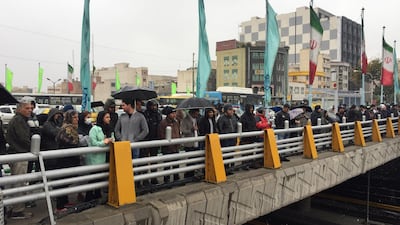One civilian was killed and other people injured in Iran's Sirjan, the semi-official news agency ISNA said on Saturday, a day after protests in the central city over a petrol price hike.
"Unfortunately someone was killed," Sirjan's acting governor Mohammad Mahmoudabadi said in the report, adding that the cause of the death was still unclear.
Protests erupted in cities across Iran on Friday just hours after the government raised petrol prices by as much as 300 per cent.
The hike has triggered demonstrations across several Iranian cities, state news agency IRNA said on Saturday.
Iran has also imposed a strict rationing system on the nation.
Under the measures, the price of petrol rose and a monthly ration of 60 litres for each private car was announced.
Any purchases over the limit would cost motorists double.
Footage reported by BBC Persian and local accounts on social media showed protesters on the streets in the city of Mashhad.
The government reportedly deployed riot police and used teargas to disperse the demonstrators.
Sky News Arabia reported that protests were happening in Tibriz, Asfahan, Tehran and Shiraz. IRNA said "scattered" protests also broke out in other cities including Mashhad, Birjand, Ahvaz, Gachsaran, Abadan, Khoramshahr, Mahshahr, Shiraz and Bandar Abbas.
Videos showing large protests in Ahwaz circulated on social media.
They were mostly limited to blocking traffic and were over by midnight, it added.
Iran's government response also involved the disruption of internet services. The observatory organisation "net blocks" reported on Friday outages across the country.
While the protests are economically driven, some of the chants were directed against the Iranian government, its regional policies and condemned the clerical establishment.
Iran imposed petrol rationing and raised pump prices by at least 50 percent on Friday, saying the move was aimed at helping citizens in need with cash handouts.
The measure was expected to bring in 300 trillion rials ($2.55 billion) per annum, the head of the country's Planning and Budget Organisation, Mohammad Bagher Nobakht, said on state television.
About 60 million Iranians in need would get payments ranging from 550,000 rials ($4.68) for couples to slightly more than two million rials ($17.46) for families with five members or more, he added.
Protests ongoing in neighbouring Iraq has also taken aim at the government in Tehran and its interference in Iraqi politics.
The Iranian government has been a target of heavy US sanctions since Donald Trump took office in 2017, and following his administration’s decision to withdraw from the nuclear deal in May 2018.
Numbers released last month by the International Monetary Fund gave gloomy indicators for Iran's economy, expecting a 9.5 per cent contraction in the GDP this year. It also revealed inflation rates of 35.7 per cent, due to the weight of sanctions.


